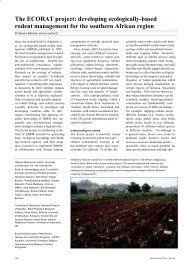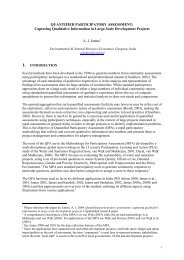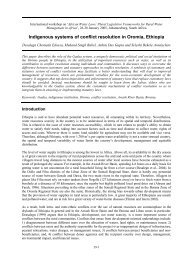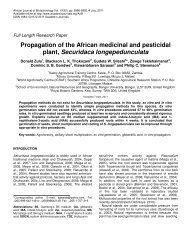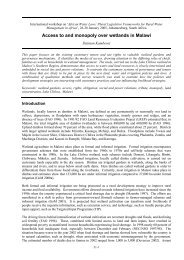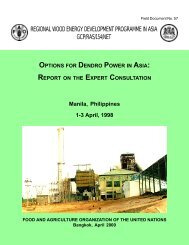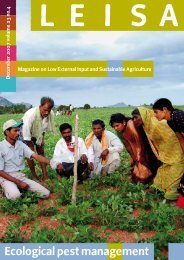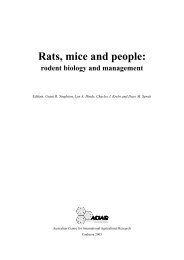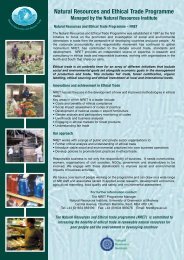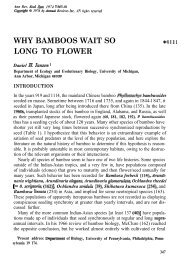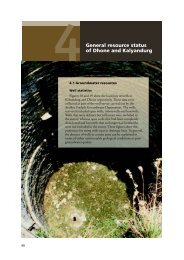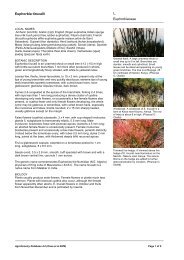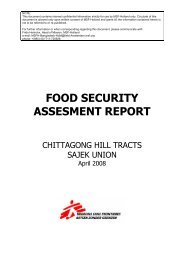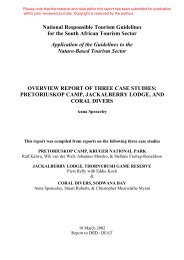Access to Rural Non-Farm Livelihoods - Natural Resources Institute
Access to Rural Non-Farm Livelihoods - Natural Resources Institute
Access to Rural Non-Farm Livelihoods - Natural Resources Institute
Create successful ePaper yourself
Turn your PDF publications into a flip-book with our unique Google optimized e-Paper software.
6 CONCLUSIONS<br />
Rakai District has had a difficult recent his<strong>to</strong>ry, which was an important fac<strong>to</strong>r in the decision<br />
<strong>to</strong> implement the RDDP, a comprehensive rehabilitation, reconstruction, and development<br />
programme funded by Danida since 1992. The RDDP has had many far reaching impacts,<br />
including on the non-farm economy, most notably through the rehabilitation and construction<br />
of roads, but also through the provision of credit, albeit with limited outreach with respect <strong>to</strong><br />
demand. It has also supported vocational and technical training for youth, particularly<br />
orphans, both directly through support <strong>to</strong> technical institutions, and indirectly through<br />
support <strong>to</strong> NGOs which offer training amongst other services.<br />
The economy of the district remains very heavily based on primary production – crop<br />
farming, notably of coffee and bananas, with annual crops in less humid areas, lives<strong>to</strong>ck in<br />
drier areas, and fishing on Lake Vic<strong>to</strong>ria and Lakes Kijanebalola and Kacheera. However, the<br />
non-farm economy is considerable, and includes trade in crops, lives<strong>to</strong>ck and lives<strong>to</strong>ck<br />
products, and fish, as well as processing of these, trade in manufactured goods, cottage<br />
industries and crafts, and services.<br />
Trade in agricultural produce, particularly coffee, is a lucrative business, although it can be<br />
risky, and is capital intensive. Large or even medium scale traders are generally considered <strong>to</strong><br />
be the pinnacle of local businessmen, and becoming a trader was often cited as the ultimate<br />
economic aspiration, particularly of younger men. Most produce is sold directly from the<br />
farm. Small scale traders move from farm <strong>to</strong> farm and then either sell <strong>to</strong> medium scale<br />
traders/transporters in the local trading centres, or arrange transport themselves, usually <strong>to</strong><br />
Kyotera. Medium scale traders either buy from small scale traders in trading centres, or<br />
employ a few trusted local people <strong>to</strong> go from farm <strong>to</strong> farm for them in exchange for a small<br />
salary or commission. Opportunities for traders have increased under the government’s<br />
liberalisation policies and with the failure of the former marketing co-operatives, albeit at the<br />
expense of farmers, who generally have little idea of the potential value of their crops, and<br />
are unable or unwilling <strong>to</strong> take them <strong>to</strong> market themselves.<br />
Processing of agricultural products occurs at an industrial scale, e.g., at coffee processing<br />
fac<strong>to</strong>ries, at the community level (e.g., electric or diesel powered maize mills) and at the<br />
household level. The first is obviously very capital intensive, and facilities are limited in<br />
distribution. The second is much more common, and is mostly based on the production of<br />
local beers and spirits for local consumption. At a small scale, brewing and distilling are not<br />
considered <strong>to</strong> be very profitable, particularly in comparison with growing crops for sale, but<br />
they can play an important role by providing income monthly as opposed <strong>to</strong> seasonally, and<br />
in spreading risk. They are undertaken by both women and men.<br />
Trade in manufactured goods is mostly in household items such as soap, sugar, matches,<br />
batteries, exercise books and pens, etc., as well as sodas and snack foods. Opening a shop<br />
requires considerable capital investment, and being a shopkeeper is a position of prestige,<br />
although lack of business skills, such as bookkeeping, means that not all shops are actually<br />
very profitable. Business is linked <strong>to</strong> agricultural incomes, and thus variable. Other retailers<br />
specialise in petrol, a business that has increased since the rehabilitation of the roads in the<br />
district, stationery, a business which has increased with increased enrolment under UPE, and<br />
second-hand clothes.<br />
65



